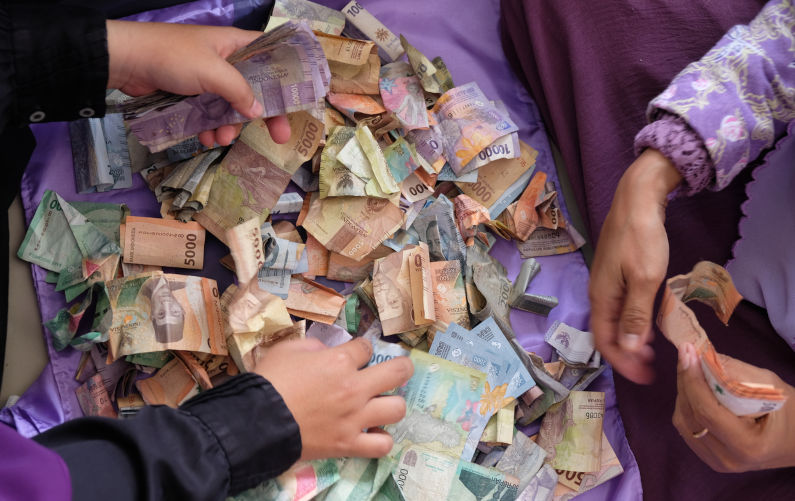Prabowo’s economic agenda faces a fiscal stress test
July 24, 2025
Indonesian President Prabowo Subianto’s first 100 days have seen a shift towards initiatives driven by national security and ambitious populism, most notably the Free Nutritious Meals program, along with rice and fuel subsidies and tax breaks, all aimed at stimulating consumption and achieving self-sufficiency. Yet slowing growth, weak tax revenues and efforts to limit VAT increases are tightening the budget. Meanwhile, the creation of new ministries and the Danantara sovereign wealth fund have added overhead costs and off-budget spending. Together, these measures strain Indonesia’s fiscal space and raise concerns about the long-term sustainability of Prabowo’s security-focused agenda.
Indonesian President Prabowo Subianto’s first several months in office have reflected a shift towards economic policy driven by national security concerns and ambitious populist programs. Drawing on his military background, Prabowo has adopted a centralised, top-down approach to governance, with large fiscal commitments aimed at achieving food and energy self-sufficiency.
But slowing growth and narrowing fiscal space raise concerns that the government might ignore fiscal prudence, risking long-term investment and economic growth. Prabowo’s ambitious populist programs and nationalistic tendencies may lead Indonesia towards a more state-directed and fiscally fragile development path.
Central to Prabowo’s populist agenda is the Free Nutritious Meals program, launched in January 2025. The government has allocated IDR 121 trillion (US$7.5 billion), equivalent to 4.5 per cent of the 2025 state budget, for the program which aims to provide free school meals nationwide. The policy is partly designed to garner political support while boosting short-term consumption. But it also underestimates fiscal risk and implementation difficulties.
This is only part of a broader fiscal expansion that includes rice aid to 18.3 million low-income families, electricity discounts for 79.3 million households and income tax exemptions for workers earning up to IDR 10 million (US$606) per month. In June 2025, the government announced additional economic stimulus measures to boost consumer purchasing power and revive economic activity after sluggish first quarter growth.
These populist measures deliver much-needed short-term economic relief, particularly as real wages remain stagnant and the middle class has yet to fully recover from the pandemic. But the fiscal trade-off is also intensifying. While subsidies and tax exemptions can act as counter-cyclical policies amid global uncertainty, they become problematic when pursued without considering long-term efficiency gains.
Weak tax revenue growth, partly due to limiting the planned VAT hike to only luxury goods, is straining the budget. Maintaining the deficit ceiling of 3 per cent of GDP has required extensive budget cuts and reallocations, and may prove difficult if expenditures continue to escalate.
The government’s institutional expansion complicates matters further. Prabowo’s cabinet is Indonesia’s largest since Sukarno’s 1960s Dwikora cabinet, with 48 ministers and 56 vice-ministers. Several new coordinating ministries, such as Food Affairs and Infrastructure, have increased fiscal overheads without clear efficiency gains. The enlarged structure also reflects political payoffs to coalition partners, raising questions about long-term policy coherence and effective governance.
One of the most consequential institutional changes is the formation of Danantara, a new sovereign wealth fund that will assume control of state-owned enterprises. This includes Pertamina, PLN, Telkom and the four largest state-owned banks.
Officially modelled on Singapore’s Temasek, Danantara differs in key respects. It is funded by state-owned enterprises’ annual dividend streams and potentially new borrowings. The fund reports directly to the president, raising serious concerns about transparency, independent oversight and the diversion of vital state revenue.
These fiscal pressures grow against a challenging macroeconomic backdrop. Indonesia’s GDP growth slowed to 4.87 per cent in the first quarter of 2025, its weakest pace in three years. This is due to subdued household consumption, weak investment and declining external demand. In May, Bank Indonesia further cut its benchmark interest rate to 5.5 per cent after an earlier 25 basis point cut in January, and revised down its 2025 growth forecast to 4.6–5.4 per cent.
External accounts are also under pressure. Exports to China — Indonesia’s top trading partner — dropped from US$64.93 billion in 2023 to US$62.43 billion in 2024 amid China’s economic deceleration. The looming US tariff hike poses a new threat to Indonesia’s exports, particularly labour-intensive garments and footwear that rely on the US market.
With coal prices trending downwards and palm oil prices peaking, the government’s energy self-sufficiency efforts are getting a temporary breather. Currently, the country’s electricity needs are largely fuelled by coal, while biodiesel from crude palm oil is being pushed to reduce oil imports. Rising oil prices — driven by the intensifying Iran–Israel conflict and other external pressures — are prompting calls for new subsidies and industrial support, reflecting the government’s interventionist tendencies.
Meanwhile, the administration’s food self-sufficiency efforts are showing some gains in the rice sector. After production shortfalls and climate disruptions drove prices to record highs, Indonesia imported 3.9 million tonnes of rice in 2024. But in 2025, government efforts to increase food production have shown results. Ministry of Agriculture data shows a rice surplus of around 2.8–3 million tonnes in April 2025, which aligns with Prabowo’s rice self-sufficiency goal. But the rising fiscal burden and uncertain long-term cost-effectiveness, especially in relation to rice estates expansion, warrant greater scrutiny.
The government’s populist policies may improve consumer spending in the short term. But its security-focused energy and food self-sufficiency programs as well as sizeable military spending need reassessment to maintain fiscal prudence.
The reduced policy influence of Finance Minister Sri Mulyani, who guarded fiscal prudence under previous administrations, also raises concern about a shift away from independent fiscal and monetary policies.
Rising off-budget spending through new institutions like Danantara reduces fiscal transparency and investor confidence, especially if independent oversight remains weak. US investor Ray Dalio’s May 2025 exit from Danantara’s advisory board signals the need for safeguards to restore credibility. Balancing ambitious populist goals with fiscal responsibility remains Indonesia’s key challenge under Prabowo’s leadership.
Republished from East Asia Forum, 19 July 2025
The views expressed in this article may or may not reflect those of Pearls and Irritations.

